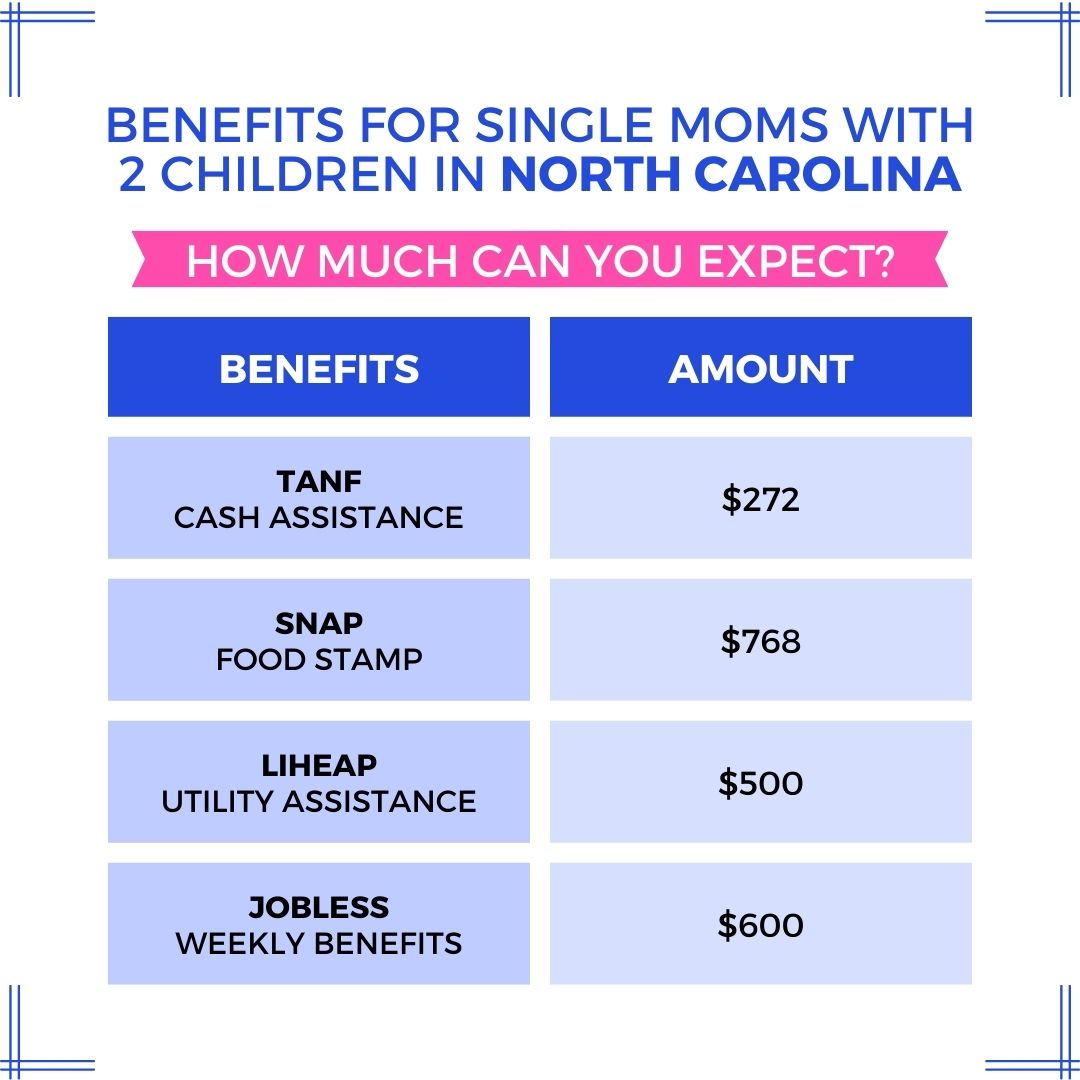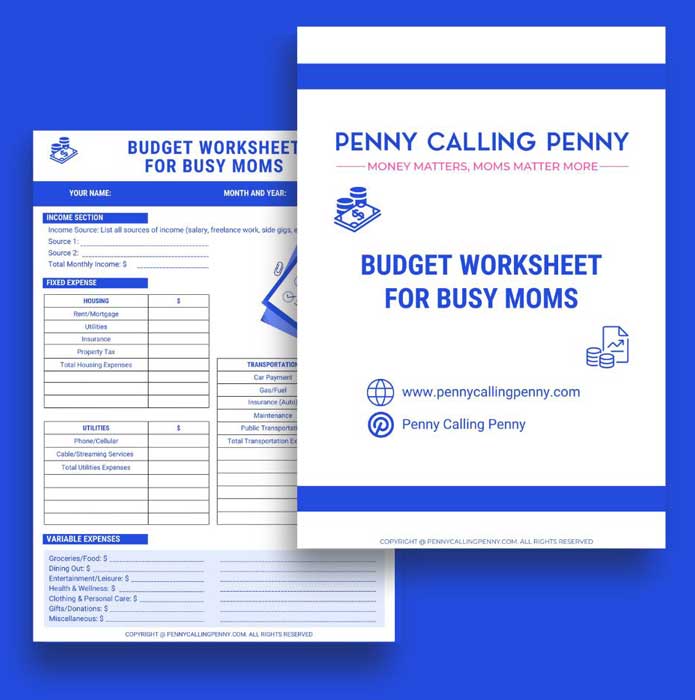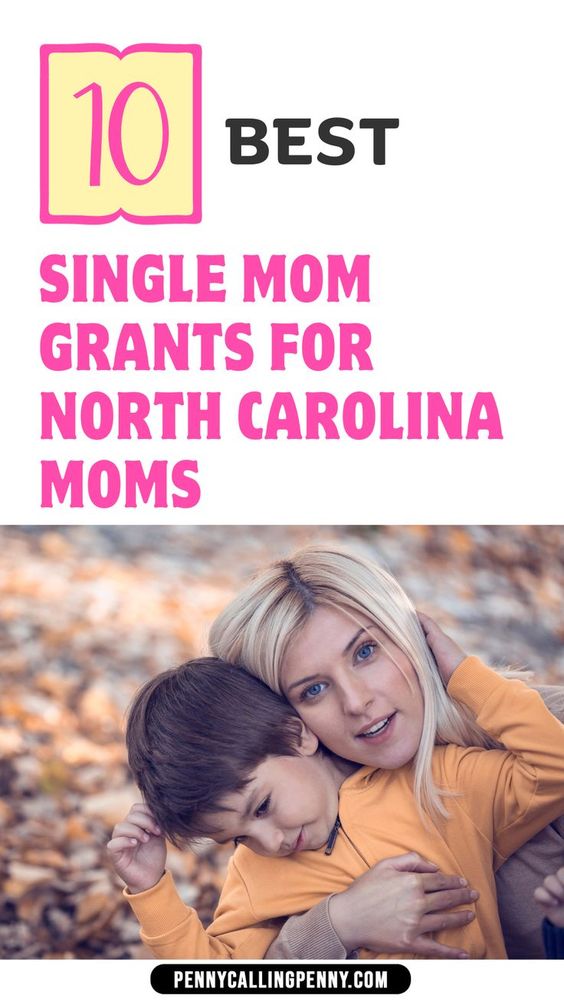The North Carolina Justice Centre reported that nearly 40% of single mothers and their children in North Carolina meet the federal poverty standard. This is due to the weight of repaying car loans, student debt, or mortgage loans, which can be overwhelming.
However, there is good news: certain organizations provide grants designed to alleviate single mothers’ financial challenges. If you are in this situation, we understand your struggles and are here to help.
This comprehensive guide will explore various grants for single moms in NC. So, if you’re seeking options to lighten your financial load, please keep reading to discover the opportunities that await you.
Top Grants For Single Moms In North Carolina
North Carolina understands the importance of helping its residents overcome financial difficulties. That’s why the state administers various assistance programs that serve as lifelines during tough times. Let’s dive into the grants available.
Unemployment Insurance
North Carolina has a program called the Unemployment Insurance Cost Management Program that helps low-income families who lose their jobs through no fault of their own. This assistance can help cover essential expenses such as housing, food, utilities, and other necessities.
Eligibility Criteria:
- Be a resident of North Carolina.
- Have a clear financial need.
- Have become unemployed due to no fault of their own.
Application Steps:
- File a claim with the Employment Security Division of the North Carolina Department of Commerce.
- Provide all the necessary information and documentation required for the claim.
- Wait for approval.
Contact Details: Individuals can file a claim and get assistance by visiting their website.

Source: Singlemotherguide.com
Work First
NC Work First, offered by North Carolina’s Department of Health and Human Services, aids single mothers in attaining self-sufficiency and well-being by providing comprehensive employment assistance. It empowers participants through skill development and connects them with job training opportunities to boost employability and career advancement potential.
Eligibility Criteria:
- Be a resident of North Carolina.
- Be a single mother with a child under the age of 18.
- Have a clear financial need.
- Be willing to participate in job training and referral services to increase employment chances.
Application Steps:
- Visit the website of the North Carolina Department of Health and Human Services or locate the local county Department of Social Services office in your area.
- Obtain the NC Work First application form online or from the county Department of Social Services office.
- Complete & submit the application form accurately.
- Wait for a response from the county Department of Social Services regarding the status of your application.
Contact Details: Individuals can visit their website or contact their Local County Department of Social Services to schedule an appointment.
Benefit Diversion
Benefit Diversion provides an alternative to cash assistance for families in temporary crises. In North Carolina, eligible families receive a one-time lump-sum payment equal to three months’ worth of Work First Family Assistance benefits, targeting those in greatest need.
Eligibility Criteria:
- Must be a resident of North Carolina.
- Must be experiencing a temporary crisis associated with employment or other sources of financial stability.
- Must meet the eligibility requirements for Work First Family Assistance.
Application Steps:
- Schedule an appointment with the Department of Social Services.
- Provide all necessary information and documentation required for the application process.
- Attend any required interviews or meetings as part of the application process.
- Wait for approval.
Contact Details: Contact your Local County Department of Social Services to inquire about the program and schedule an appointment.
Food and Nutrition Services
The North Carolina Department of Health and Human Services provides FNS, a program for single mothers. FNS, also known as Food Stamps, offers electronic benefits to purchase nutritious foods for needy families. It’s a valuable resource for single mothers’ well-being and their children’s dietary needs.
Eligibility Criteria:
- Must be a resident of North Carolina.
- Must have a clear financial need.
- Must meet the income guidelines the North Carolina Division of Social Work Services set.
- Must be a U.S. citizen or an immigrant admitted to the United States under a specific immigration status.
Application Steps:
- Obtain an application form.
- Complete the application form.
- Submit the application.
- Wait for approval.
Contact Details: You can visit the United States Department of Agriculture website to learn more about the FNS program.
Medicaid
Medicaid is a health insurance program aiding low-income individuals and families. North Carolina’s decision against expansion leaves many uninsured adults ineligible for coverage. Non-disabled adults in the state qualify only if their income falls below 41% of the poverty level, about $9,000 annually for a single mother with two children.
Eligibility Criteria:
- Parents with dependent children with a household income up to 45% of the federal poverty level.
- Pregnant women: 201% of FPL (postpartum coverage for the mother now continues for 12 months after the birth).
- Adults caregivers of children or adult relatives: 45% of FPL.
Application Process:
To access NC Medicaid Online, individuals can utilize ePASS, a web-based self-service tool in North Carolina. Through ePASS, applicants can easily submit their Medicaid/NCHC applications online.
Contact Details: You can call NC Medicaid Contact Center at 888-245-0179.

Download our free printable because guessing where your money went never worked for anyone!
(By subscribing, you agree to our terms & conditions, privacy policy, and disclaimer.)
Women, Infants and Children (WIC) Program
The Women, Infants, and Children (WIC) program in North Carolina is a valuable resource offering supplementary nutrition, healthcare, and counselling to pregnant and breastfeeding women and their children. WIC ensures women’s and young children’s well-being by providing essential health and welfare services.
Eligibility Criteria:
- Pregnant women.
- Breastfeeding women (up to one year after delivery).
- Non-breastfeeding postpartum women (up to six months after delivery).
- Resident of North Carolina.
- Income at or below 185% of the federal poverty level.
Application Process:
- To locate the WIC office closest to you, call 1-800-367-2229 or go to the NC WIC website.
- To begin your application, go to the NC WIC website and choose “Apply for WIC” or “My WIC.”
- A WIC staff member will contact you once you apply to schedule an appointment to finish the application process.
Contact Details: Call 1-800-367-2229 or visit the NC WIC website.
Health Choice For Children
North Carolina Health Choice (NCHC) for Children offers free or low-cost comprehensive healthcare for kids. It bridges the gap for children who don’t qualify for Medicaid but can’t afford high insurance premiums. NCHC covers various services, including checkups, hospital care, prescriptions, dental and vision care, and more.
Eligibility Criteria:
- Under-19-year-olds without health insurance whose families’ incomes are at or below 211% of the federal poverty level.
- North Carolina resident.
Application Process:
- Visit the website of the NC Department of Health and Human Services to submit an application, or call 1-800-662-7030 to do so.
- A representative will contact you following your application to finish the process.
Contact Details: Dial 1-800-662-7030 to reach the NC Department of Health and Human Services.
Head Start
Head Start, under the Division of Early Childhood Development, offers comprehensive educational services to low-income families, including health and emotional development support. It is an invaluable resource for single mothers, providing quality and affordable childcare options.
Eligibility Criteria:
- Children from birth to age five.
- Pregnant women and their families.
- Low income, according to the Poverty Guidelines published by the federal government.
- Children in foster care, homeless children, and children from families receiving public assistance (TANF, SSI or SNAP).
Application Process:
- Use the Head Start Center Locator to find a Head Start program near your home. Call the phone number listed to find out the next steps in the process.
- After you apply, you will be contacted by a representative to complete the application process.
Contact Details: Visit the Head Start website or call 1-866-763-6481.
Child Care Subsidy Program
North Carolina’s Subsidized Child Care Program assists income-eligible families through vouchers. Families contribute a percentage of their childcare costs based on income, usually capped at 10%. It ensures affordable childcare access, supporting work and family needs.
Eligibility Criteria:
- Resident of North Carolina.
- Income-eligible families.
- Most families, including those receiving Work First Family Assistance, must pay a percentage of their child care costs based upon their gross monthly income — usually no more than 10%, if applicable.
Application Process:
- To obtain an application, speak with your local Department of Social Services or visit the NC Division of Child Development and Early Education website.
- A representative will contact you following your application to finish the process.
Contact Details: Visit the NC Division of Child Development and Early Education website or call 1-800-859-0829.
North Carolina Community College Grant
The CFNC administers college grants in North Carolina, offering financial assistance to residents with demonstrated financial need. These grants serve as valuable resources for eligible individuals pursuing higher education. By providing financial support, CFNC helps make college more accessible and affordable for North Carolina residents in need.
Eligibility Criteria:
- Resident of North Carolina.
- Demonstrated financial need.
- Eligibility criteria vary by grant.
Application Process:
- Search for grants and scholarships on the CFNC website to see if you qualify.
- Before applying, thoroughly read the specifics, as each grant has different requirements. Note: To determine your financial need for some grants, you must complete the Free Application for Federal Student Aid (FAFSA).
- A representative will contact you following your application to finish the process.
Contact Details: You can visit the CFNC website or call 1-866-866-CFNC (2362).
North Carolina Homeowner Assistance Fund
If you are one of the homeowners who is lagging behind on the mortgage payments you can take this fund to be up to mark and keep your house. This fund also offers to provide for house-related costs such as homeowner’s insurance or property taxes. The grant offers about $40,000 in funds.
Eligibility Criteria:
- Resident of North Carolina.
- Mortgage or housing bills due.
- Household Income less than $90,000/year.
Application Process:
- Visit NC Homeowner Assistance Fund’s website and find if the applications are still accepted.
- Fill out the form if still accepting.
Contact Details: You can call on 855-696-2423.
Summer Food Programs In North Carolina
There are two food related programs- Summer Food Service Program (SFSP) and Seamless Summer Option (SSO). These food programs provide for health lunches to children over summer vacation.
Eligibility Criteria:
- Kids between 0 to 18 Years.
- Specially abled 18+.
- Income level at or less than 185% of the Federal Poverty Guidelines.
Application Process:
- Visit the website.
- Search for a food site near you.
- Apply for the same if eligible.
Contact Details: You can call at 984-236-2914.
Vaccines For Children Program In North Carolina
This program offers free vaccines for children with the help of participating providers.
Eligibility Criteria:
Children need to meet one of the following:
- Medicaid eligibility
- Without health insurance
- Belong to American Indian or Alaska Native.
- Underinsured
Application Process:
- Visit website to know about participating providers.
- Confirm if the kid’s doctor is a VFC provider.
- Go to your local health department.
Contact Details: You can call at 1-800-232-0233 (TTY 888-720-7489).
Conclusion
With many available grants for single moms in NC, you can now access many resources that cater to your unique needs. These grants provide essential tools for your well-being and success, from educational opportunities to child care assistance, housing support, and beyond.
It’s heartwarming to see how grants for single moms in NC act as a powerful catalyst, enabling you, an incredible woman, to overcome challenges and thrive while creating a nurturing environment for your children.
We’re certain this article has provided you with valuable insights. If you’d like to receive more articles like this, please consider subscribing to our newsletter. By doing so, you’ll be the first to know when we publish new article. Remember, knowledge is key to financial prosperity.
Did you take our Reader Survey? If not, it only takes 1 minute and you can take our survey here.
FAQs
Yes, as a single mother in North Carolina, you can apply for multiple grants to optimize the financial aid accessible to you. By seeking multiple grants, you enhance your prospects of obtaining support in various aspects, creating a more inclusive support system for you and your family.
Grants provided to North Carolina single mothers are not subject to taxation. These grants are generally non-taxable since they do not qualify as earned income.
The way you can use grants as a single mom in North Carolina depends on the rules and restrictions set by each grant program. Some grants allow flexibility in how you can use the funds, while others may have specific guidelines or limitations on their purpose.










